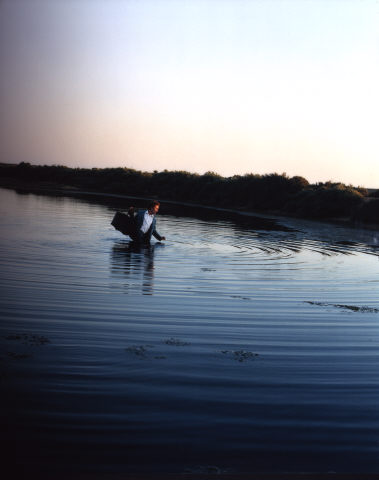
- 2001
- Photographic paper
- Photography
- Inv. 02FP455
Armando Ferraz
Untitled (Round Reversion) of the Series Azul e Rotineiro [Blue and Routinely]
If the figure in this image was to be found in an urban setting he would most likely go unnoticed. However, the oddity of the situation in which the author placed him prompts many questions: why crossing that space? What led to that event? What is he carrying inside that suitcase?
We stand before a staging as a strategy of questioning, which is brought about by a subversion of or a conflict with the processes of a logic of perception between what is seen and what is prescribed by daily experience.
The spectator, just like the figure, is thus placed between two margins in an attempt to reframe a space that, for the time being, is solely inscribed in the domain of fiction.
The quest to fixate elements within the image becomes pointless. Is it late afternoon or an early morning? Africa, America or Europe? These are all possibilities that generate a limbo of spatial and temporal indeterminations, enacting the breakdown of an image depleted of coordinates and fluctuating in the ambiguity of the viewer’s perception.
The last resort is to give in to metaphor as a strategy to work out the image.
Let us return to this image. Note the figure in a complete suit, observe the suitcase that he carries, notice the difficulty in moving, and watch the undifferentiated landscape closely. Surely, these are elements that we might transpose onto the quotidian of a city.
The figure, like Saint Cristopher carrying the weight of the world in a bag to the other side of the river, makes use of the metaphor of crossing, of the human condition of moving and voyaging, as both a civilizational and a present-day imperative.
Through the image, the disjunction between stage and figure creates a dramatic intensity that leads to an emancipated reflexion of the spectator, leading him to autonomously ponder upon the social logics involved in the construction of stereotypes.
JO
May 2012
| Type | Value | Unit | Section |
| Height | 150 | cm | |
| Width | 120 | cm |
| Type | Acquisition |
| 7/10 - 7 artistas ao 10º mês |
| Lisboa, CAM/FCG, 2001 |
| ISBN:972 635 135 9 |
| Catálogo de exposição |
| Densidade Relativa |
| Lisboa, CAM/FCG, 2005 |
| ISBN:972-635-169-x |
| Monografia |
| Densidade Relativa |
| Leonor Nazaré |
| Curator: Leonor Nazaré |
| 27 de Outubro de 2005 a 22 de Janeiro de 2006 HALL de entrada e Piso 1 no CAMJAP |
| 12-8-2006 a 26-11-2006 Centro Cultural Emmerico Nunes e Centro das Artes de Sines |
| A ideia de trabalhar o conceito de densidade das obras começou por surgir com a constatação de que a palavra é muito frequente nos textos de crítica de arte. O mesmo acontece com a palavra intensidade que facilmente se associa à primeira. Rapidamente se percebe que densidade pode ser sinónimo de riqueza ou de impenetrabilidade, quando não se refere mais literalmente à acumulação de elementos no espaço, por oposição ao vazio ou à rarefacção. O pensamento em torno destas variantes conduziu à percepção de que o conceito poderia ser útil no estabelecimento de um contínuo entre a matéria do pensamento e a dos corpos e objectos, neste caso, a das obras de arte. |
| 7/10 - 7 artistas ao 10º mês |
| CAM/FCG |
| Curator: Francisco Vaz Fernandes |
| 11 de Outubro de 2001 a 5 de Janeiro de 2002 Centro de Arte Moderna José Azeredo Perdigão |
| Exposição com obras de Alexandre Estrela, Amando Ferraz, Carlos Roque, Inês Pais, Nuno Cera, Rui Toscano e Rui Valério. |